Pros
Cons
Introduction
Overall Design
{{section_header}}{{section.name}}{{/section_header}}
The high-end HDTVs of today are well-designed, metal and glass, barely have a bezel, and look more like sculptures than electronics. The Vizio E470VA has some aesthetic flair, but that's just not enough to cut it any more. The glossy black plastic might allow for a less expensive price tag, but attractive it isn't. We think the E470VA is better looking than average, but it's not gorgeous.
Front
{{section_header}}{{section.name}}{{/section_header}}
The front of the Vizio E470VA is surrounded by a glossy black bezel. The outside left and right edges are semi-translucent. Under the screen, in the center, is a Vizio logo that lights up when the TV turns on.
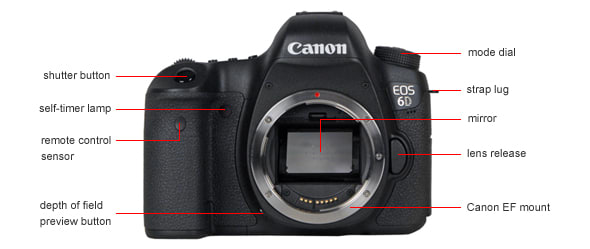
Back
{{section_header}}{{section.name}}{{/section_header}}
The back of the TV is covered in glossy black plastic. There's a cluster of ports in the bottom right corner, some of which are facing down.
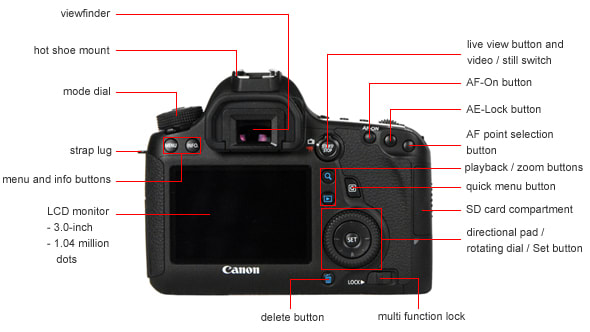
Sides
{{section_header}}{{section.name}}{{/section_header}}
The left side of the TV has a handful of ports and a dial-button, the TV's main control method.
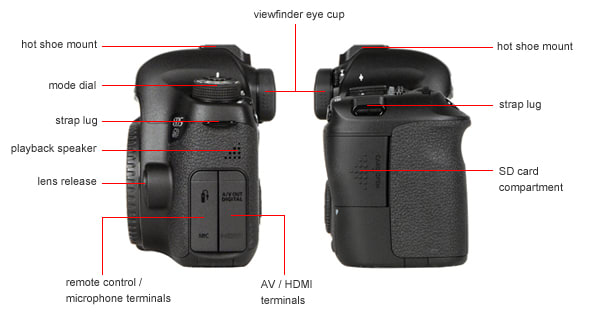
Stand/Mount
{{section_header}}{{section.name}}{{/section_header}}
The Vizio's stand is an oval shaped piece of glossy black plastic. It doesn't swivel.
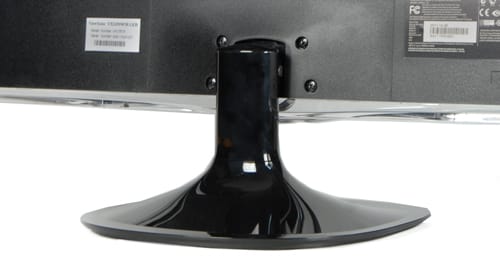
Controls
{{section_header}}{{section.name}}{{/section_header}}
The Vizio E470VA only has the standard array of on-set controls. They cover all the basic functionality.
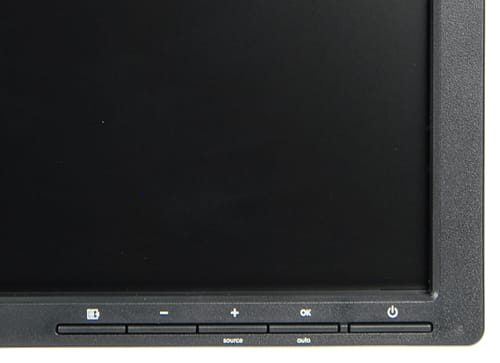
Remote Control
{{section_header}}{{section.name}}{{/section_header}}
The Vizio's remote is a fancy affair that slides open to reveal a tiny QWERTY keyboard.
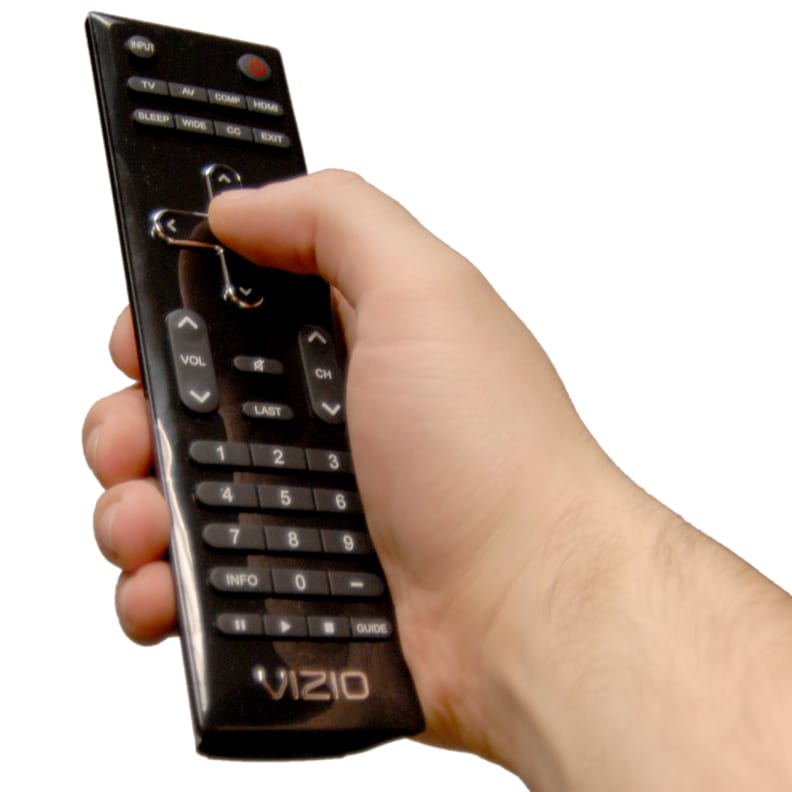
In the Box
{{section_header}}{{section.name}}{{/section_header}}
In the box you'll find the TV, remote, batteries, and manuals. Nothing special or extra here. The TV also doesn't require any setup: the stand comes attached. Just extract your E470VA from its packaging, plug it in, and enjoy.
Black Level
{{section_header}}{{section.name}}{{/section_header}}
We measured the Vizio E470VA's black level at 0.31 candelas per square meter (cd/m2). To put this number in context, a "good" black level would fall somewhere around 0.1 cd/m2—a third of what it should be. The reason the black level is so high is because Vizio's latest batch of TVs employ an auto-dim feature, Smart Dimming, that's meant to be enabled. If you want a deep black, you'll have to turn this feature on. Unlike most HDTVs, it won't necessarily negatively impact picture quality in other areas, but the processing isn't perfect: if you're watching something that frequently switches between dark and bright scenes, the change in backlighting can become distracting. More on how we test black level.
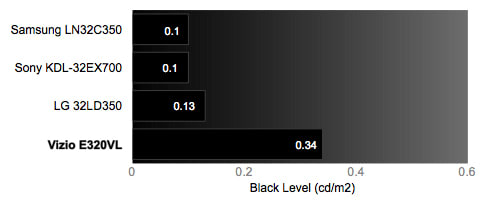
Peak Brightness
{{section_header}}{{section.name}}{{/section_header}}
The E470VA had a pretty low peak brightness for a LCD HDTV: 173.71 cd/m2. Typically you need 200 cd/m2^ for optimal viewing. Having a low peak brightness means bright areas could have poorer detailing, and that external light will wash out the image onscreen.
We also performed this test with the Smart Dimming feature on. It didn't have a significant effect. More on how we test peak brightness.
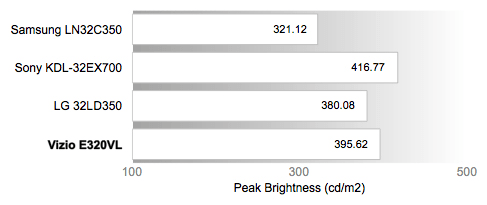
Contrast
{{section_header}}{{section.name}}{{/section_header}}
If you want a high contrast ratio, you're going to want to switch on Smart Dimming mode: with the mode disabled, the TV won't be capable of a very high contrast ratio at all: we measured it at 571:1. Flipping the feature on does have some downsides, but it might help eke out a higher contrast ratio if the conditions are perfect (this assumes an backlight zone displaying a bright image is near a backlight zone displaying a dark image—auto dim features are currently only good with large areas of a similar luminance, not fine details). More on how we test contrast.
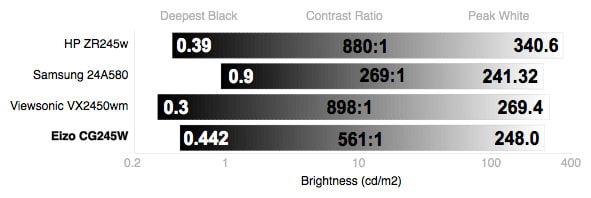
Tunnel Contrast
{{section_header}}{{section.name}}{{/section_header}}
The TV didn't have much trouble maintaining a black level, assuming the Smart Dimming feature is off. If the feature is on, the TV really can't maintain a deep black. More on how we test tunnel contrast.
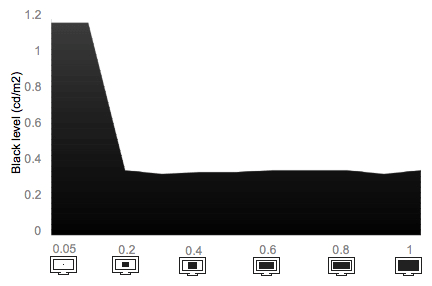
White Falloff
{{section_header}}{{section.name}}{{/section_header}}
The TV's peak brightness wasn't affected as the percentage of white onscreen changed. Since the TV has such a low peak brightness to begin with, this consistency is important. More on how we test white falloff.
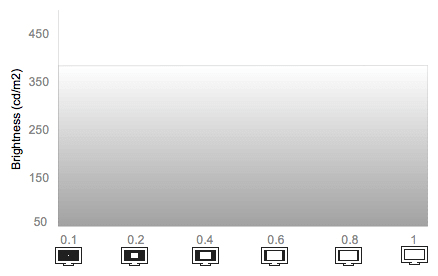
Uniformity
Greyscale Gamma
{{section_header}}{{section.name}}{{/section_header}}
Greyscale gamma measures how the TV handles the the monochromatic shades between black and white. When you plot all the greys on a graph, you should get a uniform slope around 2.1. Here we measured the E470VA's greyscale gamma at about 2.89, which is a significantly more aggressive curve than it should be. If you look at the below graph, you can see that there isn't very much differentiation between darker colors. That's why the rest of the slope is so steep: it has fewer steps to cover the same spectrum. A gamma this steep means the TV might have problems with diffuse patterns: gradual shade transitions will look like concentric rings of similar shades. More on how we test greyscale gamma.
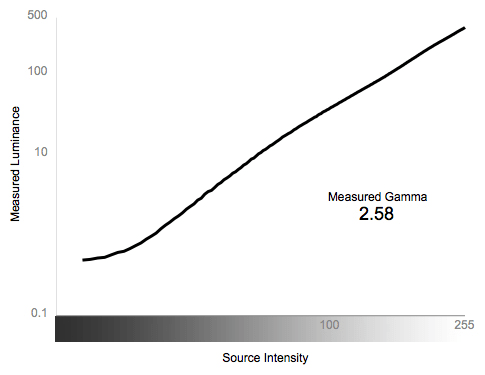
Color Temperature
{{section_header}}{{section.name}}{{/section_header}}
The Vizio E470VA had a pretty even color temperature. It leaned towards the cool side, but not by an amount that was particularly perceptible. You shouldn't have any problems here. More on how we test color temperature.
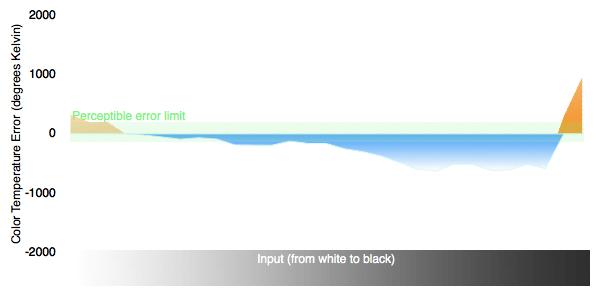
RGB Curves
{{section_header}}{{section.name}}{{/section_header}}
The E470VA would have great RGB response if it weren't for the blue curve peaking so low in the spectrum. The curves have a good slope and aren't jagged, meaning a nice, even progression from their darkest shade to to their brightest. The blue curve progresses far, far more aggressively than it should, and hits its maximum luminance very early. This means bright blue areas will likely look a bit flat, since the TV can't differentiate between the brightest shades. More on how we test RGB curves.
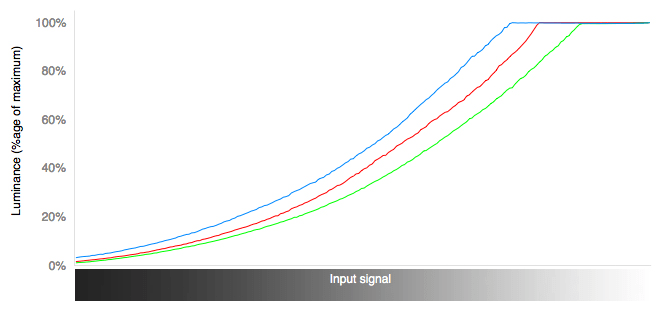
Below you'll find the red, green, and blue responses from the above chart plotted as gradient bars. We've also including the RGB responses of several competing models. Look for how aggressively the gradient blacks out, or for any vertical stripes. You want a nice, even progression that retains as much of the spectrum as possible; vertical stripes indicate a loss of detail.
Motion Performance
{{section_header}}{{section.name}}{{/section_header}}
Motion Smoothness (8.00)
We didn't see much motion blurring on the Vizio E470VA. We saw some very fine details getting smudged, such as eyes, or fine patterns, but otherwise the picture remained crisp. The TV also has some motion processing, which helps reduce the minimal amount of blur, but will make your movies look overprocessed.
Motion Artifacting (7.25)
We didn't see much in the way of motion artifacting either. There was some slight shudder as static images moved around the screen, which gets slightly worse if the image being displayed is a fine pattern. Otherwise, however, the TV didn't have any issues here. We did notice turning the motion processing up created slightly more artifacting issues, such as ghost images or, in some cases, created a minor flashing effect.
We also ran the motion tests with Smart Dimming enabled. It can create some problems, especially with the the rigorous test patterns we run. The issue with this and all local dimming features is that there are simply too few zones (the areas of the screen that have their own dimming). If a bright object crosses a black background, the objects takes on a wide, diffused halo because the blacks that occupy that same zone are getting brighter, as well. It presents a real problem with movies set in outer space, or during credit sequences, or in any scenes of high contrast. More on how we test motion performance.
3:2 Pulldown & 24fps
{{section_header}}{{section.name}}{{/section_header}}
set Film Mode to Auto and you won't see any issues with the E470VA's 3:2 pulldown or 24fps playback. More on how we test 3:2 pulldown and 24fps.
Resolution Scaling
{{section_header}}{{section.name}}{{/section_header}}
The Vizio E470VA has a native 1080p resolution, but unless you're exclusively watching Blu-ray discs, your TV will have to display nonnative content. The TV has no problem with 480p and 720p content, but it definitely had a problem with 1080i. Many fine patterns appeared green or yellow in 1080i. Some flashed for a few seconds when they came on screen. What's interesting is we saw these same issues with native content too. Typically these sorts of errors are due to problems with the processing used to upscale or downscale content—it's rare to see a 1080p HDTV have trouble with 1080p content.
The TV also had issues with its native resolution. We saw all se issues were also present in the TV's native 1080p resolution. More on how we test resolution scaling.
480p
The TV forced a small overscan at this resolution, but didn't have any issues otherwise. We thought images looked sharp and were relatively free of artifacting.
720p
The TV did a great job with 720p. The minor hiccups were limited to some very faint flashing and discoloration, but you these issues only happened when the TV choked on a very fine pattern.
1080i
This wasn't the best performance we've seen. Fine patterns had some serious discoloration: greys were color shifted to yellow or green hues.
Formats
{{section_header}}{{section.name}}{{/section_header}}
The Vizio E470VA is a 1080p HDTV, although it had some issues displaying native content.
Viewing Angle
{{section_header}}{{section.name}}{{/section_header}}
The E470VA had a decent viewing angle for an LCD. You can get up to 36° off-center before your contrast ratio will be reduced to about half. The average LCD will drop below 50% contrast ratio in about half that distance.
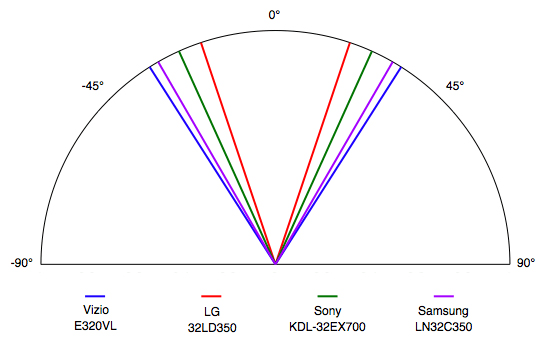
Reflectance
{{section_header}}{{section.name}}{{/section_header}}
External light will create a large diffuse glow on the E470VA's screen, assuming the light is shining directly at the screen. If the light is shining at the screen from an angle, it'll catch the bezel but otherwise won't bother you.
Video Processing
{{section_header}}{{section.name}}{{/section_header}}
The Vizio E470VA has a few processing features, described below. You should probably leave most of them turned off.
Calibration
{{section_header}}{{section.name}}{{/section_header}}
An HDTV will rarely come out of the box perfectly calibrated. Since we want the TVs at their best before we test them, we first fiddle with the settings. Our calibration rig consists of a CS-200 ChromaMeter and DisplayMate.

All of our calibration is done in conjunction with the DisplayMate software.
](http://www.displaymate.com/)
Video Modes
{{section_header}}{{section.name}}{{/section_header}}
The Vizio E470VA has quite a few video modes: Standard, Movie, Game, Vivid, Football, Golf, Basketball, Baseball, and Custom.
Connectivity
{{section_header}}{{section.name}}{{/section_header}}
Input Ports (5.50)
The Vizio E470VA has a good selection of ports with a small degree of extensibility. The TV has 4 HDMI ports, 1 composite video port, 1 component video in, 2 analog audio inputs, and 1 3.5mm audio in. Additionally, the set comes with three adapters you can use to convert the USB ports into another composite video in and analog audio input.
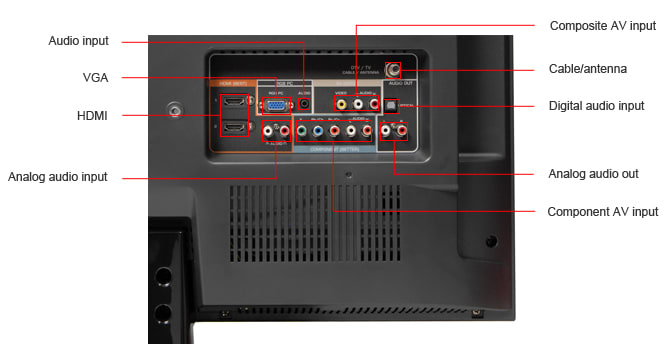
Output Ports (2.00)
The TV has two output ports: an analog audio out and a digital audio out.
Other Connections (4.00)
The Vizio E470VA has an ethernet port and built-in wifi (802.11n). You can use either to connect to the TV's online content.
Media (3.00)
The TV has three USB ports, but they can't be used for additional media playback.
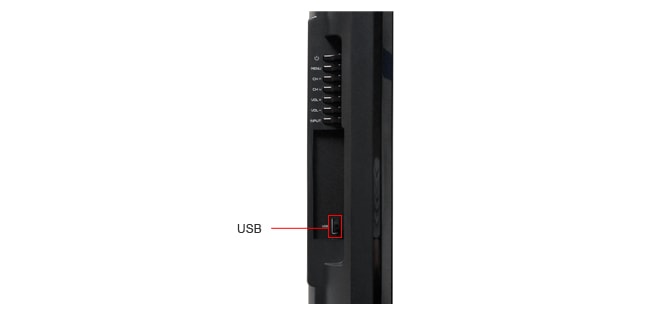
Placement
{{section_header}}{{section.name}}{{/section_header}}
The TV does not have good port placement, primarily because a handful of its ports are facing downward. Downward-facing ports are a pain to access. That, coupled with the lack of a swiveling stand makes makes the E470VA kind of a pain to hook up to.
Audio Quality
{{section_header}}{{section.name}}{{/section_header}}
The Vizio E470VA has decent audio performance for a TV in its size and price range. There are few options in the menu to change the sound quality. It's mostly limited to turning the surround sound emulator on or off (we liked it 'on') and an automatic volume limiter.
For best sound quality, we always recommend an independent audio system.
Menu Interface
{{section_header}}{{section.name}}{{/section_header}}
The menu on the Vizio E470VA has been completely redesigned from the 2009 Vizios we reviewed, with significant improvements. Response times are faster, the look is cleaner, and the organization is more effective. Combined with the excellent remote control, we were impressed with the whole menu interface.
The main menu is broken up into a grid pattern with icons. The choices here are fairy straightforward. Once you select an option from here, you're taken to a vertically-aligned menu with all the options spelled out. For better or for worse, the menus will not disappear from the screen unless you explicitly exit the menu.
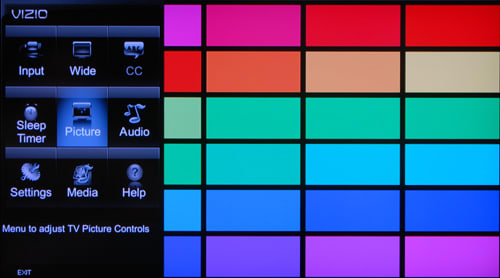
Instruction Manual
{{section_header}}{{section.name}}{{/section_header}}
The instruction manual is a big, magazine-sized, color document. Some of the pictures inside and cheap and cheesy, but we liked that all the information was spelled out. There's a table of contents and an alphabetical index to help guide you. You can find the Vizio E470VA's manual online here.
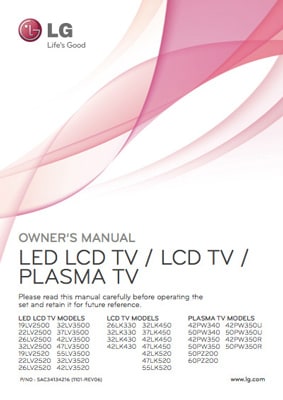
A manual for so many TV models, they have to be further categorized by type.
Internet Features
{{section_header}}{{section.name}}{{/section_header}}
The Vizio E470VA has a number of streaming content features. The main feature set is simply a plug-in of Yahoo TV widgets, which is found on several other TV manufacturers. So long as Yahoo keeps adding content partners, Vizio owners will keeping finding offers for new apps to download. A complete list of offerings (to-date) can be found in this massive comparison chart.
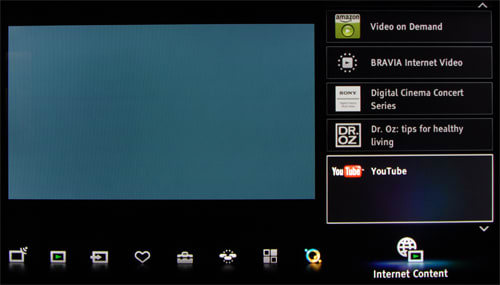
Local Media Playback
{{section_header}}{{section.name}}{{/section_header}}
Although the TV has three (3!) USB ports, they can't be used for media. The TV does include adapters, however, that turn these ports into another set of A/V inputs.
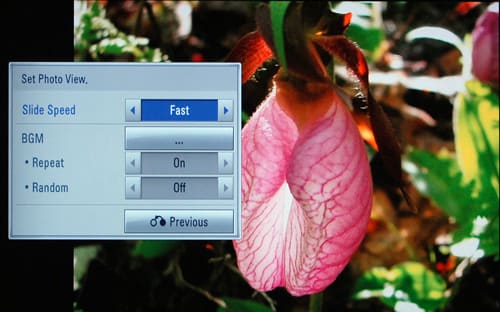
Other Media
{{section_header}}{{section.name}}{{/section_header}}
The TV doesn't have any other media capabilities.
Power Consumption
{{section_header}}{{section.name}}{{/section_header}}
The Vizio E470VA doesn't require that much power to run. Assuming average use, the E470VA will only cost about $26.37 at its highest backlight setting. That's about on par with other LCDs in this size range: It's under a dollar more per month over the average.
Below we've listed a few competing TVs' yearly costs, which are all roughly the same.
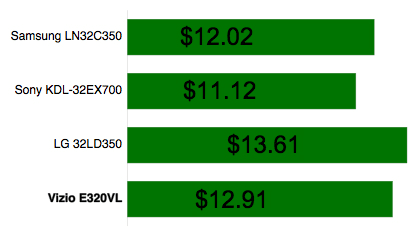
Value Comparison
{{section_header}}{{section.name}}{{/section_header}}
The Sony NSX-46GT1 isn't so much about value as it is about its one defining feature: the Google TV platform. This software allows the Sony to browse the internet just like you could on your home computer, providing someone replaced your keyboard with an XBox controller. If you don't mind paying extra for this feature, the NSX-46GT1 is pretty much the only game in town at the moment. If you'd rather save some money and just buy a vanilla TV—because it's not like the TV does anything you couldn't do on a computer—the Vizio is a much better choice.
Blacks & Whites
{{section_header}}{{section.name}}{{/section_header}}
The Sony had a deeper black level than the Vizio, but the Vizio was capable of outputting more light. In the end, though, black level is significantly more important to a good contrast ratio than brightness: the Sony NSX-GT1 ended up with a much higher contrast ratio.

Color Accuracy
{{section_header}}{{section.name}}{{/section_header}}
Both TVs had roughly the same color performance.
Motion
{{section_header}}{{section.name}}{{/section_header}}
The Vizio didn't have as many motion problems as the Sony.
Viewing Effects
{{section_header}}{{section.name}}{{/section_header}}
Practically speaking, these two TVs' viewing angles are about the same. If you want to get technical, the Vizio has a wider angle, but it wasn't by much.
Connectivity
{{section_header}}{{section.name}}{{/section_header}}
The main difference between these two TVs has nothing to do with picture quality—neither TV soundly bested the other. In terms of connectivity, however, the Sony has a bit of a trump card: an ethernet port. Not only does this give the Sony NSX-46GT1 online features, but the Google TV platform give the TV an actual internet browser.
Conclusion
The Vizio E470VA is a good TV for its price, but it won't impress people looking for the best picture quality or features. The TV doesn't have any of the now-standard extras, line online connectivity, so you should really only expect the basics here. On our tests, we found the E470VA didn't have a very deep black level or particularly accurate colors, but the picture quality will be good enough for the average viewer. If you're looking for an inexpensive TV that's just a TV, the Vizio E470VA should be worth your consideration.
Model Series Comparison
{{section_header}}{{section.name}}{{/section_header}}
The Exx0VA series is a very basic set of LCDs from Vizio. Don't expect online connectivity or the greatest picture quality.
Photo Gallery
{{photo_gallery "Front Tour Image", "Back Tour Image", "Sides Tour Image", "Stand Photo", "Controls Photo", "Remote Control Photo", "Connectivity Tour Image 1", "Connectivity Tour Image 2", "Connectivity Extra Photo", "Menu Main Photo", "Menu 2 Photo", "Internet Features 1 Photo", "Internet Features 2 Photo", "Internet Features 3 Photo", "Local Media Playback 1 Photo", "Local Media Playback 2 Photo"}}
Ratings & Specs
{{manufacturer_specs_table}}
Meet the tester
Mark Brezinski works on the Home Team, reviewing refrigerators, minifridges, dishwashers, washing machines, dryers, air conditioners, air purifiers, and fans.
Checking our work.
Our team is here to help you buy the best stuff and love what you own. Our writers, editors, and experts obsess over the products we cover to make sure you're confident and satisfied. Have a different opinion about something we recommend? Email us and we'll compare notes.
Shoot us an email